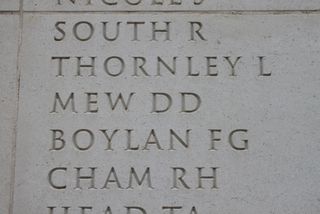|
Person
Lance Corporal 14467055 Derek Dudley Mew, Gloucestershire Regiment Source Biography from the Book of Remembrance, All Saints Church, Newchurch, Isle of Wight. |
|
|
|
Biographical information :
The name of LANCE-CORPORAL DEREK DUDLEY MEW does not appear on the Cenotaph in the
Parish Cemetery - that memorial records the names of our Parish dead in the Wars
of 1914-18 and 1939-45 and Derek was to lose his life in the Korean War of 1950-53, but as
this account below will show, the people of this Parish have cause for ever more to
remember this young soldier from Apse Heath who fought under the flag of the United
Nations.
Derek was born at 'Rothesay', Ventnor Road, Apse Heath, on 20th March 1922, the elder son of Dudley Mew, brickyard worker, and Violet Blanche Mew.[1] He attended Newchurch School throughout his boyhood schooldays from 1927 until 1936 and upon leaving school he was apprenticed as an airframe fitter at the Somerton works of J. Samuel White Limited at Cowes. As a child he attended the Methodist Sunday School at Apse Heath, where he is remembered as a serious and rather nervous little boy but with an engaging grin when something amused him. Although brought up in a family noted locally for its great interest in sport of all kinds Derek was not particularly keen on any particular form of recreation although in his late teens he took up ballroom dancing at which he showed considerable talent. When World War II commenced Derek Mew had two years of his apprenticeship to serve and when he finally became a skilled man he continued at his work throughout the remainder of the War until 1944. During these years he was a member of the Sandford section of 'C' (Shanklin) Company of the 20th Battalion Hampshire Home Guard. In 1944 Derek volunteered to join the Parachute Regiment, arriving home on his first leave with his parachutist's emblem proudly displayed and looking as smart a soldier as one could wish to see. His training as a paratrooper was carried out at Parkhurst, Aldershot and Colchester with the usual spell at Ringway, Manchester for actual parachute training. After a period of home service Derek's regiment was posted to Kingston, Jamaica in 1948 and it was there that he spent the next two and a half years. As his period of engagement came to an end, following the usual practice of transferring to an infantry regiment, Derek was posted to the Gloucestershire Regiment and it was with that regiment that he set out for the Korean War. He arrived in Korea in November 1950 where he served as a radio and signal operator to the commanding officer of 'A' Company of the 1st Gloucesters, Major Pat Angier of Bembridge. The magnificent exploits of the 'Glorious Glosters' are now part of our miltary history but their final stand in the Battle of the Imjim River ranks with the finest moments of any of the County regiments. Among the many killed was Derek's commanding officer, Major Angier, and the small band remaining alive fell prisoners to the Chinese. Driven by their captors, Derek with his comrades marched for six weeks over a distance of some 300 miles to a secret camp near the Yalu river on the Manchurian border. During the whole of the march their only food was barley meal mixed with warm water and the lack of food rapidly took its toll of the marchers. The prisoners were lice-ridden and filthy dirty and many fell by the way. On arrival at the camp they found conditions little better, although the men were no longer faced with a daily march. One of Derek's mates, a young man from Brading, told of Derek's inability to swallow the appalling food although in a starving condition and slowly the symptoms of beri-beri disease appeared. Many more died and as they became ill, they were removed from those who remained comparatively fit to another part of the camp from which there was little hope of return. In a most moving letter home dated 3rd September 1951, after a preamble obviously written under duress, Derek wrote "Do not worry too much will you. I want to see you when I return. I will return you can rest assured of that." [1] The Roll of Honour gives his mother as Violet Blanche - she was actually Olive Beatrice (née Finlay). Lance-Corporal Derek Dudley Mew died on 21st September 1951, and is commemorated on the United Nations Memorial at Pusan. Also commemorated at the Armed Forces Memorial at the National Memorial Arboretum 
Family information : Derek Dudley Mew was the nephew of Colin Douglas Finlay (died 19 Apr 1917, Gaza), whom he would not have known, and Colin Finlay's younger brother, Roy Norman Finlay (died 17 Jan 1942, loss of s.s. Culebra). Links : Korean War Roll of Honour website Acknowledgments : Janet Griffin for further research (Finlay family connections) Page last updated : 25 September 2014 |


Memorials & Monuments
|
|
|